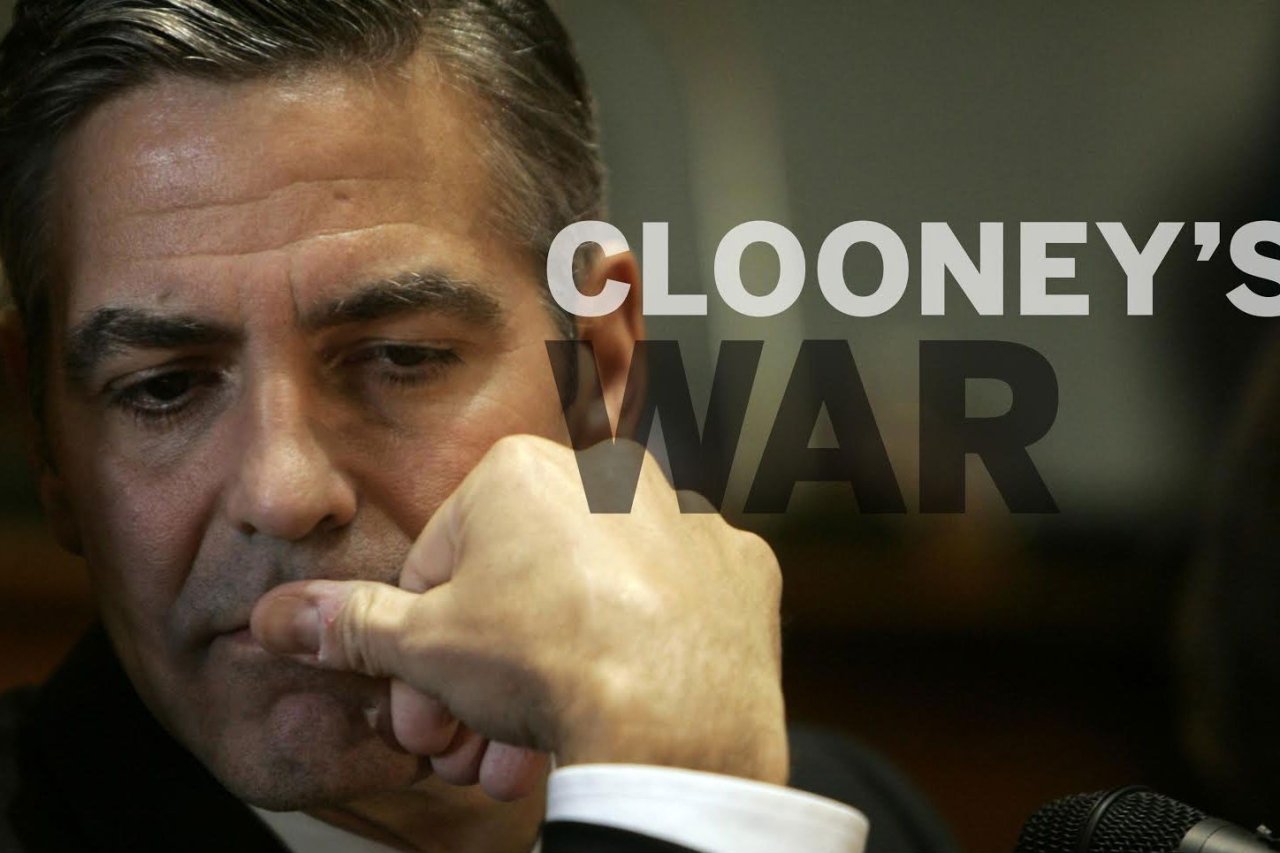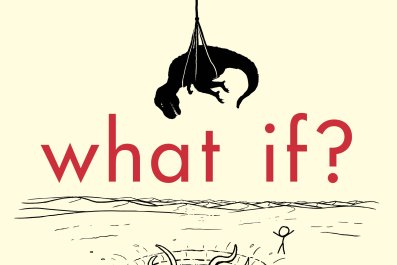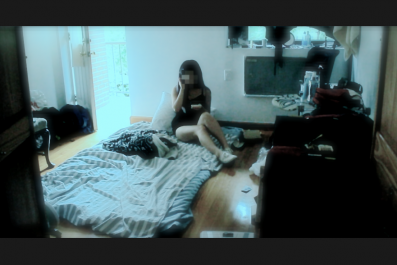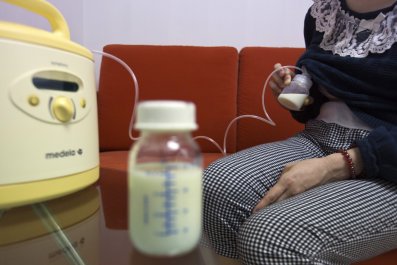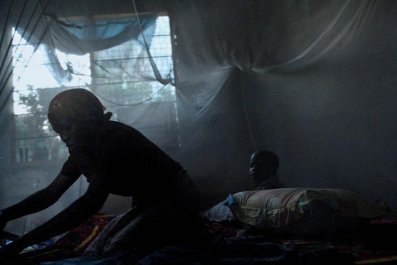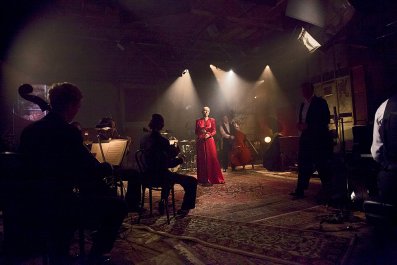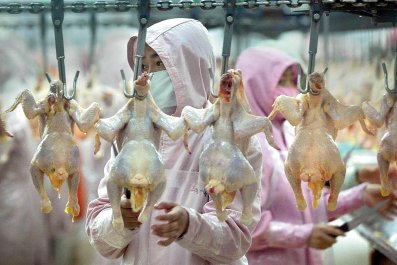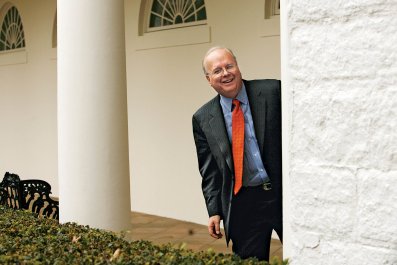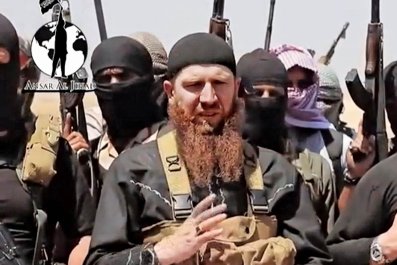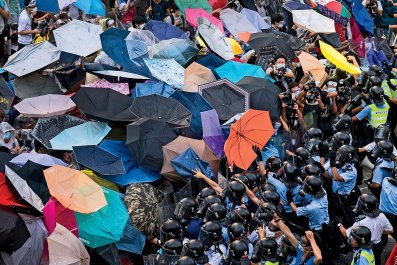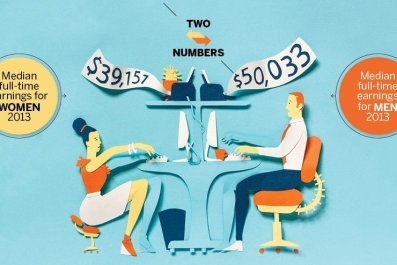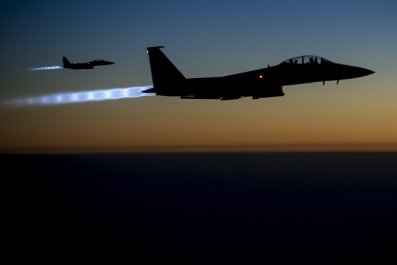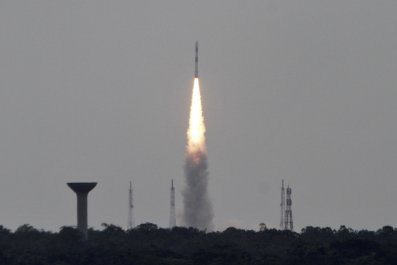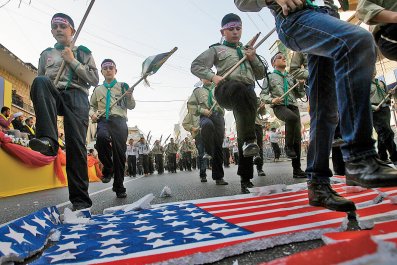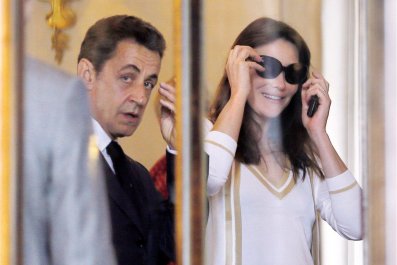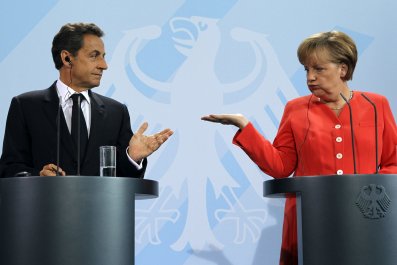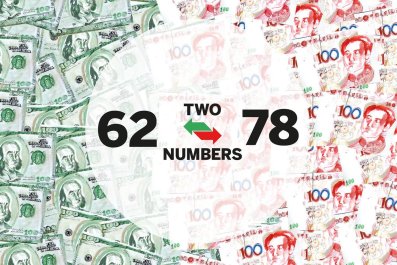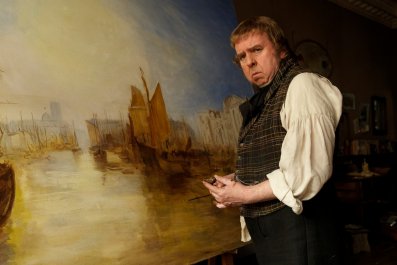March 2012, A Bar on the Nile
It was mid-morning and the staff were still wiping down the bar and clearing away the empties when George Clooney ambled over to my table. Clooney had a couple of hours before he headed north to the fighting and we'd agreed to meet by the Nile, at the aid worker hotel where he stayed. The river was something to behold, a wide green trench filled with all the rain from the plains of Africa that cut due north, across the Sahara, all the way to the Mediterranean. But Clooney ignored the view. Instead he surveyed the grass-roof over the bar, the tiny collection of bottles clamped to the wall and the empty stools still grouped in small, convivial circles.
"You been here at night?" asked Clooney. I said I had. "So you know it gets pretty wild in here," Clooney chuckled. "I've had some wild nights in here."
Clooney and John Prendergast, his fellow Sudan activist, had just flown into Juba, capital of South Sudan. In a few hours, the pair would be inside a war. To reach it, they would fly to a dirt strip beside a refugee camp in the far north of South Sudan, just below the newly-made border with Sudan. There they would transfer to a battered, metal-floored SUV driven by Ryan Boyette.
Boyette was an American former aid worker who married locally and never left. He was an activist, too, documenting atrocities against the Nuba people by the Sudanese regime. He had volunteered to drive Clooney and Prendergast illegally across the border and into the Nuba Mountains' rebel territory where Boyette and his wife lived in a stone house he'd built himself. A few months before, the Sudanese air force had tried to bomb the house. The route the three would take would lead them up a dusty track that the planes were now hitting almost daily. It was the bombings – barrels of oil attached to explosives rolled out of planes – that Clooney had come to see.
"It should be interesting," said Clooney. "They're dropping those bombs from 6,000 feet so their effectiveness has been mostly to terrorise and less to actually . . . The bigger issue is violence on the road. Some guys just shot and killed and slit the throats of some people going up that road. So you have to be careful."
I asked if he was worried. Clooney shook his head. "It's OK," he said. "We've been in some sticky situations before and we're going with some guys who know what they're doing. "And you know," he said, "you gotta do it."
Movie-Star-in-Chief
If we had to have celebrities, it seemed to me that Clooney was absolutely the best kind. It was March 2012 and Clooney was on his seventh trip to Sudan in as many years. In that time his activism had cost him hundreds of thousands of dollars. I could only imagine the angry conversations he must have endured with worried studio heads and agents in Hollywood when he announced he was off to war in Africa. Now one of the biggest stars of his generation was about to fly to a spot about as far from a hospital as it was possible to be on Earth, and then drive away up a lethal dirt road.
Clooney's activism tracked Sudan's various rebellions. Before it split formally into north and south in July 2011, Sudan had been Africa's biggest country, straddling the line in the Saharan sand where Africa meets Arabia. In centuries past, like the efforts of European Christian imperialists further south, Arab attempts to enlighten heathen Africans took the form of slave-raiding, then conquest, then economic marginalisation.
After independence from British/Egyptian rule in 1956, the regime in the Sudanese capital Khartoum took its cue from this history, creating an autocratic state that exploited its regions for oil, then spent the money on itself. It was precisely that kind of behaviour that had provoked the tide of African liberation in imperial times.
So it was that Khartoum was soon confronting rebellion in almost every region of the country, especially its more Christian, more African and more southern ones. Khartoum responded with repression and, after a military takeover in 1989, the kind of strident Islamism that even persuaded Osama bin Laden to make Khartoum his home for five years in the 1990s. In a half-century of more or less continual fighting, more than two million people died.
Partly because the death toll in Sudan's wars was so high, partly because Islamists became America's enemy number one after 9/11, partly because Sudan's continued use of slaves horrified a nation whose own creation myth was so bound up in the trade, Sudan became the cause for young American activists in the first years of the new millennium. And Clooney became their champion.
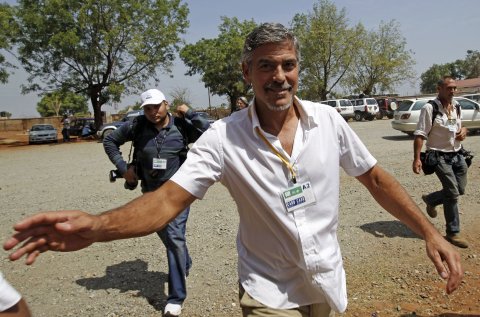
Initially he spoke out against the Sudanese regime's atrocities, in 2003 and 2004 in the west Sudan region of Darfur. After the US government designated that conflict a genocide in 2004, Clooney was among those who successfully campaigned to have the International Criminal Court indict Sudanese president Omar al-Bashir for war crimes and crimes against humanity.
In 2005, the US brokered a peace agreement between Sudan and its largest and most southern rebel army, the Sudan People's Liberation Army (SPLA). The deal included a referendum on secession and in the years that followed, Clooney's campaigning – which included interviews, television appearances, addresses to the US Congress, the Senate and the UN Security Council and talks with US president Barack Obama – helped convince the world the ceasefire should be a first step towards full southern independence.
Clooney was duly on hand in Juba in January 2011 when southern Sudanese voted by 98.8% to split Sudan in two and form the world's newest nation. "It was wild," he said. "I literally watched this 90-year-old woman, who'd never voted in her life and who'd walked a couple of miles to a polling station to vote for the first time in her life for freedom. There's something mind-blowing to see 98% of the people voting, [to see how] they consider it a duty and an honour and a privilege."
Despite the deal, Khartoum never wavered in its enmity towards the southerners, but also other rebels such as the Nuba, who remained within its new truncated borders.
In October 2010, Clooney was in Sudan with Prendergast trying to work out ways to hinder the bloodshed when, lying out in the desert and looking up at the stars, the pair came up with an idea even more outlandish than helping to create a new country in Africa: their own spy satellite. "I was like: 'How come you could Google Earth my house and you can't Google Earth where war crimes are being committed? It doesn't make sense to me. And John was like: 'I don't know. You know, maybe we can'."
On their return to the US, the pair contacted Google Maps and a satellite photography specialist, DigitalGlobe. They rented time on three of DigitalGlobe's satellites stationed in the stratosphere over Sudan and processed the images and overlayed them with Google Maps in minutes. "The trick was not just to get the images but to get them in close to real time and get the analysis done quickly," said Clooney. "Then you can say 'Well, five days ago this is what this place looked like. And this is what it looked like two days ago'."
I told him I thought the idea was brilliant, if a little insane. "It's a very effective tool," he replied. "If you're going to put 150,000 troops on a border, you're going to have a really tough time claiming this is just rebel infighting if that's going to be photographed by satellites, up close and personal. It makes it harder to get away with. It makes it impossible for the UN Security Council to veto action against Khartoum. We know it's effective because the government in Khartoum keeps saying what a rotten bunch of people we are and how it's not fair."
Clooney laughed. "I love the 'It's not fair' thing," he said. "Literally stomping their feet. 'It's not fair!' The Defence Minister came out and said: 'How would Mr Clooney like it if every time he left his house there were people watching him with cameras?'"
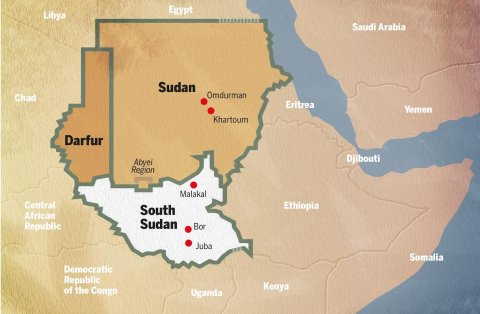
You had to admire the inversion. Clooney, whose privacy was routinely invaded in pursuit of trivialities, was violating the privacy of a dictatorial regime in the pursuit of saving lives. He was using his fame and fortune to try to change a place which, without him, would have remained far more obscure. He presented a less self-indulgent model of celebrity than usual and, with his stature and influence in his industry, could even lay claim to reinventing the whole notion of fame.
Clooney also knew his limits. He had a clear goal – prevention of human suffering – and a well-defined idea of his role. "The reason I come is not because I'm a policy guy and not because I'm a soldier and not because I can do anything except get this on TV and in the newspapers," he said. "The thing that's frustrating and disappointing – and you in the news organisations know this better than anybody – is that the assumption is always: 'Well, if we know, then we do something about it.' And that just isn't true. I mean we knew about Rwanda. We knew about Bosnia. We knew. But there was plausible deniability. So we're going to try and keep it loud enough that at least they can't say they didn't know."
Clooney's efforts revealed imagination and refreshing depth. His campaigning was also effective. But when I thought about it later, in some ways that only made it stranger. Because he was charming and handsome and famous and rich, Clooney had been able to help engineer the creation of a vast new country in a faraway land. The fabulousness of one of Hollywood's leading men, normally used to sell movie tickets and watches and coffee, had changed millions of lives and the course of history. Good for Clooney. But if this was how Western power worked, it was absurd.
At one point I asked Clooney whether he'd met his adversaries in northern Sudan, whose consistent complaint was that Sudan's future wasn't the business of an American actor, no matter how cool he was. Clooney replied that his one trip to Khartoum had been frustrating because the government had obstinately refused to listen to him. As Clooney saw it, they forced him to play tough. Clooney was not asking himself, as I was trying to, what any of this – Sudan – had to do with him. Rather, he was acknowledging that in practice it had had a lot to do with him – from the moment he decided it would. He had the clarity of moral obligation. Because he could, he should.
I couldn't help think it was more complicated than that. Why should a Hollywood actor wield such influence over a distant foreign land? Why should any outsider? How, really, could you foster someone else's independence? Surely the whole point with independence was that people had to do it for themselves?
December 2013: Implosion
Twenty-one months later, South Sudan imploded. On December 15th, 2013, there was an attempted coup in the new capital, Juba, by ethnic Nuer soldiers in the presidential guard. Or, as the Nuer had it, Dinka soldiers acting on orders from the paranoid South Sudanese president, Salva Kiir, himself a Dinka, tried to disarm them by force. Whatever the truth, a firefight erupted in the barracks and spilled out on to the streets. Around 500 soldiers died.
The violence reflected an unresolved split among South Sudan's leaders dating back to their time as rebels. All through their fight with Khartoum, ethnic rivalry among southerners had overlapped with political ambition and flat-out greed. In all the years of war with the north, more southerners had died fighting each other than against Khartoum. At times, the Nuer leader, Riek Machar, even sided with the north. In one notorious attack in 1991, he sacked the Dinka capital, Bor, massacring thousands of civilians.
At independence in July 2011, the Dinka, South Sudan's largest tribe, took most government and army posts. President Kiir made an effort to broaden the new state's base by making Machar his deputy. But relations between the two never healed; in July 2013 Kiir fired Machar, along with his entire cabinet, and replaced them with loyalists. From that moment, another showdown was only a matter of time.
The soldiers' firefight provided the spark. Dinka soldiers began carrying out pogroms across Juba, singling out Nuer soldiers and civilians and shooting them in their homes and in the street. Nuer mutinies erupted in army units across the country. Machar fled the capital and set up a command post in the northern bush. Nuer militias soon began their own series of reprisal massacres against Dinka. Almost immediately, the conflict threatened to widen into a regional war. Machar seemed to be receiving tacit support from Ethiopia. He also appeared to be angling to restart the north-south war, making overtures to Khartoum about renegotiating the split the South paid it from its oil revenue in return for pumping the crude to the Red Sea. Kiir, meanwhile, welcomed reinforcements from Uganda.
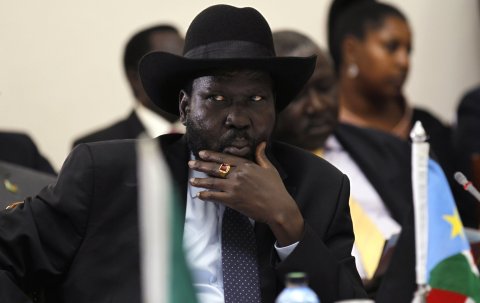
Nuer and Dinka mobs began attacking their neighbours. Militias went house to house, demanding to know who was Nuer, who Dinka. Thousands were executed, their bodies left in the street. Children were shot as they ran. Fathers had their throats cut in front of their families. Women and girls were abducted and raped.
Coming on the 20th anniversary of the Rwandan genocide, the blood-letting sharpened memories of how, a few hundred miles to the south, up to a million people had died in 100 days. With each new massacre, the parallels grew. As in Rwanda, families turned on each other. Women and children who sought safety in churches and hospitals and schools and outside UN bases were slaughtered en masse. When a Nuer militia fell on the northern town of Bentiu, massacring hundreds on April 15th and 16th, the UN reported that the killers were spurred on by exhortations on local radio stations, just as they had been in Rwanda. The next day, Dinka militiamen stormed a UN base at Bor and started shooting and slashing at Nuer refugees, killing at least 58. Twenty years before, the world had promised: never again. Newspaper editorials in America and Europe now asked: were those empty words? Could it be happening again? How could it?
April 2014: Mostly Bones
By the time I arrived back in Juba in mid-April 2014, the violence had been raging for four months. Three state capitals had been razed. Up to 40,000 people were dead. More than a million of South Sudan's population of 6 to 11 million – a measure of the lack of development is that nobody knows for sure – had fled their homes and 250,000 of those had walked abroad. With no one left to tend the farms, the UN was warning 7 million South Sudanese needed food aid and 50,000 children could die of hunger in months. By those figures, the speed and depth of South Sudan's collapse outdid even Syria's.
Clooney was now pointing his satellite at his former friends in the south, particularly the city of Malakal, a state capital an hour's flight north of Juba near the new border with Sudan. Nuer rebels had taken Malakal three times. Three times the SPLA had re-captured it. The last period of rebel occupation in February had been especially devastating. Clooney's before-and-after pictures showed that where once there had been hundreds of tin shacks and thatched huts, now there were just blackened smudges.
More fighting in and around Malakal seemed imminent. South Sudan's government depends on oil fields close to the city for 98% of its revenue and Machar was vowing to take those, then Juba, then overthrow Kiir – and the SPLA was preparing to stop him. I was due to fly up to Malakal with the UN but they mixed up the times so Mading Ngor, a South Sudanese journalist with whom I was working, called a friend in the SPLA and within an hour we were in the cargo hold of a white Ilyushin 76 transporter being flown up-country by seven portly Ukrainians.
In Juba the night before, Ngor and I sought out a government official who had just returned from Malakal. "You will find mostly bones," said the man when we asked him what to expect. "They killed them in the streets and in the churches and in the hospital, then they burned the town to the ground. The dogs and the birds have been at the bones. Malakal isn't there any more." Sure enough, when the Ukrainians threw open the plane's door at Malakal, Ngor and I immediately smelled the bilious stench of bloating corpses.
We walked to the side of the runway. Around 200 people were gathered on its edge, apparently surrounded by everything they'd managed to save. Bedsteads. Bicycle wheels. Tightly packed suitcases. Whole sheets tied up in great bundles. They told us they'd been there for weeks, hoping for a ride to Juba. The Ukrainians unloaded the trucks, pulled up the crew ladder and made ready to depart. Suddenly there was a cry and, as one, the crowd picked up their cases and mattresses and babies and ran to the open plane door. A stand-off ensued. The crowd remonstrated. The Ukrainians refused to lower the ladder. A dog began circling the nose wheel, barking at the pilots above. Ngor and I left them to it.
With Malakal destroyed, we planned to stay at a UN base a mile outside town. The road there was lined by hundreds of rope beds, set up like an endless, open-air dormitory. Underneath were small piles of plastic bags, tin plates, car wheels and bamboo poles. People were busily adding to their piles, arriving from Malakal carrying wooden planks, plastic sheets, plastic chairs, more poles and more beds. Maribou storks as tall as teenagers strutted between the beds, stooping and picking.
Suddenly we were in a small market. Tiny mountains of tomatoes, onions, nuts and tamarind were stacked on the bare earth under sheets of plastic tied between poles. A hundred metres further on and we were through the base gates. There were more market stalls and thousands more people – and at first I thought the UN had flung open its gates to the refugees. But after another 50m we passed through a second set of gates, ringed with razor wire and policed by a sentry checking IDs, and the stalls, people and noise ended.
We turned into a long avenue of prefabricated bungalows, perhaps 100 long and five rows deep on each side, more than 500 cabins in all. Parked in front were hundreds of white SUVs marked "UN" or stamped with the logos of international aid agencies. An air-conditioning unit stuck out from each bungalow. Most also had a satellite dish on a metal spike out front. Some were surrounded by small gardens of bright pink bougainvillea, aloe and neem.
Ngor and I wandered the main street. Aside from a jogger who passed us with an iPod strapped to his forearm, the base looked deserted. We came across a cafeteria, then a bigger building on whose arch was written "Hard Rock Complex" in the style of the US chain. After a while we found a door marked "administration". Inside, a man sat at his desk, typing on his computer. A badge around his neck announced that he was Imad Qatouni, general services assistant. I asked how things were. "So far, so good," replied Qatouni.
I tried again. "How many refugees are outside?" I asked. "Maybe 22,000," he said. "They come and go. It changes every day." Qatouni told us he would find someone to show us where to put our tents. Then he said: "We are providing catering for everybody." At first I thought he meant the refugees. He didn't. "It's 20 South Sudanese pounds for breakfast, and 30 for lunch and dinner. Very reasonable. Out there even a tomato will cost you 15 Sudanese pounds. We even reduced the prices. Tonight you will get turkey, spaghetti, rice and soup."
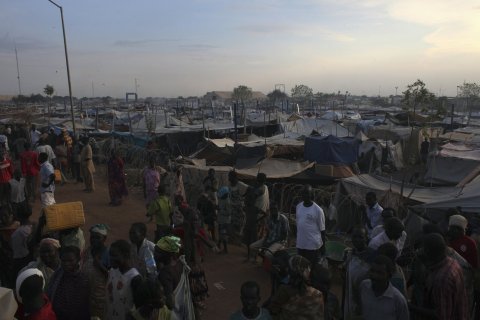
I asked about going into Malakal. "There is no town," said Qatouni. I said we'd heard as much. It was the destruction we had come to see, I explained. Qatouni said he couldn't help us there. "I have never been outside," he said. "I have nothing to do there. The military have to do it, so they do patrols. Some of the NGOs go with them. Maybe you could go on patrol too."
The next morning Ngor phoned another SPLA friend and a jeep came to meet us. As the driver turned on to a main road leading into the city, the destruction began. It announced itself quietly at first. A smashed doorway here. A burned-out hut there. A small stall spilling its plastic and paper guts on to the street. But then, suddenly, Malakal ceased to exist. In every direction was black earth, blackened stubs of walls and bent tin sheets. It was as though a hurricane had passed through. Ngor and I got out and began walking through the debris, sinking up to our ankles in the ash. I came to a metal front gate, now standing alone, the walls on either side vapourised. Behind it a brick house still stood, though its windows were blown out and the wall around them was now smudged with a sooty eye-shadow. We were walking through incinerated lives.
The wreckage under our feet began to assume a medical theme – pill bottles, medicine sachets – when I looked up and saw we were outside Malakal Teaching Hospital. We walked through the front gates over a carpet of silver condom strips. Computers had been dragged out and smashed. Patient records littered the corridors. Gold and purple Christmas tinsel hung on the walls.
We drove to Malakal's Nile river port. I'd read how in early January more than 200 people trying to escape the violence drowned here when an overcrowded ferry sank. Most of the dead were children. Some, I saw, had not even made it that far. Just by the port gates was a small skull next to a tiny shinbone. Inside there were more bones: an arm, a leg, another small skull next to a black silk hairband. As I walked over, I kicked something. A tiny coccyx skittered across the concrete.
A hundred metres on we were outside St Joseph's Catholic Cathedral. We walked through the gates, across more piles of papers and garbage and up the steps, stepping over a dark patch of blood. There were no bones here. Instead the floor of the cathedral was a sea of brightly coloured clothes in small, neat piles. Perhaps 250 of them. Tucked underneath I found several collections of family photographs. These were the kind of pictures mothers kept, I realised. They would have grabbed them as they fled their homes. Where were the women now? What had happened here to make all these mothers abandon their dearest keepsakes?
Ngor and I drove back to the UN base and began asking around among the refugees. Ernest Uruar was 52, spoke some English and wore a turquoise Unicef cap. "I was in the hospital after Christmas," he said. "We ran there to save ourselves. My two boys, 16 and 14, died trying to get away when a canoe sank on Christmas Day. So it was just me, my wife and my mother-in-law. We were there when the rebels came the third time. They were just killing people, even the wounded, even my mother-in-law. They were asking 'Who is Dinka? Who is Nuer? Who is Shilluk?' If you were Dinka, you were shot. It didn't matter even if they were children."
Uruar, who was from a minor tribe, said he'd run with his wife to the cathedral. Hundreds of others did the same. "The rebels were looting the town," he said. "Then they were coming to the cathedral to look for girls. They raped them." How long did this go on for, I asked? "Two months," he replied. "Whenever the rebels were around."
"Two months?" I asked. "The rebels used the cathedral as a rape camp for two months? When there was a UN base full of peacekeepers 10 minutes away?"
"Two months," repeated Uruar. At this point, a younger man who'd been listening in interrupted: "They would say: 'You come, and you, and you. And they would take these girls and use them. One night they took seven and they did not return two. We don't know what happened to them. My sister was killed. And other relatives." The man paused. "Only I came out," he said quietly. Abruptly, he walked away.
Uruar watched him go. "Even you cannot describe this," he said. "How it became. How we became. When they take the girls, if you are a man and you want to say something, they will beat you and kill you. It was two months of this. Killings and abuses and rapes. And then the UN came. After the rebels had left. They did not risk until it became peaceful. They saw people dying and they did not move."
I asked Uruar what he thought of the protection offered by the UN. He considered his reply. "In a way, they had a hand in all this destruction," he said. "They saved our lives late."
Lunch back at the base was rice, lamb, broccoli and black-eyed peas. With most base residents cocooned all day in their air-con cabins in front of their screens, lunch was one time we got to see them. They would emerge in Bermuda shorts, T-shirts and sandals, shuffling to and from the cafeteria, perhaps stopping in at the Hard Rock Complex to use the gym or shoot some pool in the rec room. How many planes, how many trucks, how much sweat and how many tens of thousands of dollars it had taken to drag that pool table halfway across the world over some of the worst roads in Africa to Malakal?
Later, Ngor and I went to meet the SPLA general who had re-taken Malakal, Johnson Bilieu. We passed hundreds of SPLA soldiers carrying furniture out of deserted houses and loading up trucks in the street. When we mentioned it, the general was defensive. We let it pass. I told the general I wasn't clear how many people had died. Thousands, he said, apologising for not being more precise. The dogs had dragged so many away, he said. They split up the skeletons. Hundreds more bodies had been washed away by the river. I asked the general what he made of the UN's efforts to protect civilians. "Slow," he said.
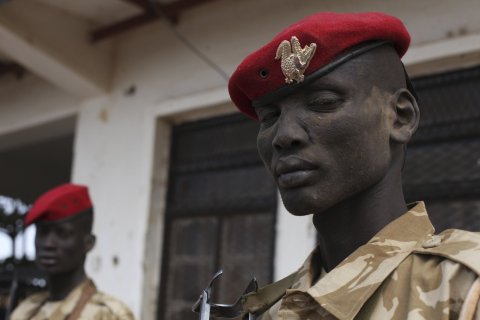
It was late afternoon by the time we left. Driving back to the base, we took a different route. We passed an open field with a number of earthen mounds in it. It took me a few seconds to register what I had seen and I had to ask the driver to turn around and go back. The field turned out to be the town cemetery. Just inside the gate was a large expanse of freshly dug earth, perhaps 25m wide and broad. Behind it was another one, and behind that, and further on, and on either side several more.
I counted 13 large mounds, 24 medium-sized ones and more than 100 small ones. Sitting on one mound was a skull, half of its cranium missing. I asked our SPLA driver if he knew how many were buried in each large grave. "About 20 to 30," he replied. Ngor phoned the general. The graves hadn't been dug by the SPLA, he said. But by then we already knew. In the earth were the tracks of fat tyres of heavy lifting machines of the kind sitting at the entrance of the UN base. The world had guided the South Sudanese to freedom. Two and a half years later, it was shovelling their bodies into mass graves with bulldozers.
August 2013, White Saviours
In August 2013, I made a request under Britain's Freedom of Information Act, asking the Foreign Office to release some confidential files on the Biafran civil war in Nigeria in 1967–70. They contained reports on a pioneering Geneva-based PR agency, Markpress, led by an American called William Bernhardt. MI6's file provided a methodical account of how, by co-opting celebrities and journalists, Markpress and Bernhardt created the first modern humanitarian campaign.
In 1967, southern ethnic Igbos had rebelled against Nigeria's northern elite, favoured by the British Empire, declaring the secession of a state they called Biafra. Markpress had been hired by the rebels to generate support in the West.
"[Markpress] has for over a year, we hear, been flying out groups of German and Swiss journalists," wrote P Arengo-Jones in a letter marked "Confidential," dated October 16th 1968, and addressed to London from the Swiss town of Berne. In another, he continued, "We are finding it very difficult to isolate the mercenary involvement of people with Markpress from their humanitarian concern for the Ibos (sic). One of them, a well-known broadcaster, makes frequent trips to rebel-held parts of Nigeria but is always able on his return to broadcast about the child resettlement scheme in which he helps."
What so mystified Arengo-Jones was how, despite being commercially contracted itself, Markpress was succeeding by advocating a belief in selfless, elevated ethics – the need to "do something". The idea behind this type of Western intervention would be not to kill others or seize territory or protect interests but to save lives and restore some morality to the exercise of Western power.
Nevertheless, the humanitarians' campaign also drew on several colonial precedents. Imperialists believed the exercise of European power necessarily improved a place; the Biafran humanitarians believed it would too. The bad guys in Markpress' Biafran presentations would have been familiar to any Christian colonialist: they were Muslim, in particular soldiers of the Muslim-dominated Nigerian army and the mobs who beat and killed the Christian Igbos. The campaigners described the crimes of these Islamist barbarians with a word invented for the Holocaust: genocide.
Biafra remains a template today for the ideas, organisations and individuals it brought to prominence. In particular, Biafra set the stage for a certain type of swashbuckling humanitarian. Unicef, Save the Children and Caritas were all on their first foreign ground operation in Biafra, and Oxfam only its second. Médecins Sans Frontières, the most glamorous of all aid agencies and the winner of the 1999 Nobel Peace Prize, was founded specifically for Biafra by Bernard Kouchner, the future French foreign minister. Kouchner was then a Red Cross worker who quit his organisation in disgust at the way its neutrality prevented it from distinguishing righteous from wrong. Another figure in this movement was a young French populist philosopher, Bernard-Henri Lévy. A third was the former UN High Commissioner for Human Rights, Brazilian Sergio Vieira de Mello.
With no shortage of foreign crises on to which to project their vision, this small, charismatic group quickly grew into a worldwide movement. The aid groups deployed to an earthquake in Nicaragua in 1972, a hurricane in Honduras in 1974 and set up refugee camps for Cambodians in Thailand in 1975. In 1979, Kouchner filled a boat called L'Île de Lumière (The Island of Light) with doctors and journalists to sail the South China Sea administering to fleeing South Vietnamese boat people.
In the 1980s in Afghanistan, where Médecins Sans Frontières, and a crop of other relief groups were patching up those wounded in the mujahideen fight against a Soviet invasion, the humanitarians made a second, crucial evolution. The new thinking was that Western military power could be good if exercised righteously and in the cause of liberty. Might could be right. Wars could be just.
Around the same time, the aid workers' ranks were swelled by a tide of celebrities. Famously, in 1984, the Irish singer Bob Geldof watched television news images of a famine in Ethiopia and underwent a conversion from selfish, priapic rockstar to curmudgeonly humanitarian. Geldof put together an all-star charity record, Do They Know Its Christmas? which raised £6m for famine relief. Six months later Geldof staged Live Aid, simultaneous all-star concerts in London and Philadelphia that were broadcast around the world. The concerts raised more than $100m. Famous friends simultaneously increased the humanitarians' impetus, and self-regard.
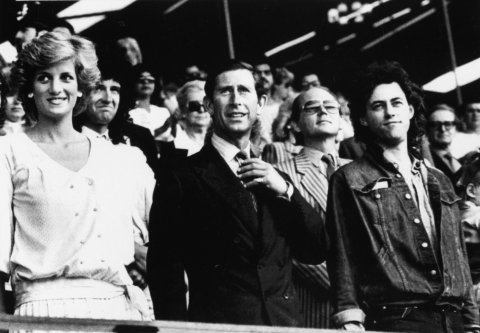
The humanitarian cause suffered a setback in 1992-93 when a US mission to support a UN effort to address another famine, this time in Somalia, ended with Black Hawk Down. Televised images of the bodies of two of the 18 dead US soldiers being dragged through the streets led to anguished questions. What were we thinking of? What were our boys doing there? But when accounts of the Rwandan genocide began emerging in April 1994, the US and the rest of the world were castigated for not being there.
Among those torn by guilt over Rwanda was a young official at the National Security Council under US President Bill Clinton, Susan Rice. "I swore to myself that if I ever faced such a crisis again, I would come down on the side of dramatic action, going down in flames if that was required," Rice would later say.
Rwanda's effect was to make the case for humanitarian intervention seem incontestable. In 1999 in Kosovo, where Kouchner and de Mello both served as UN special representatives, Nato bombed the Serbs out of humanitarian concern. Also present was a young reporter, Samantha Power. Based on her experiences, Power wrote a biography of de Mello and a Pulitzer Prize-winning book, A Problem from Hell: America and the Age of Genocide, in which she sketched out an emerging philosophy justifying Western humanitarian intervention as a moral obligation.
In 1999, de Mello took a job as UN administrator in East Timor, where he vigorously repelled attacks by Indonesian security forces and Muslim militias on the Catholic East Timorese. In 2003, Henri Lévy became one of the few Europeans outside the British government to support the US invasion of Iraq and Afghanistan – on the grounds that fighting Islamism was a humanitarian cause.
After Kouchner became French foreign minister under the centre-right administration of Nicolas Sarkozy in 2007, he formally reversed France's opposition to the war and the broader war on terror. Iraq and the bloody sectarian chaos that ensued proved a second setback. It also claimed de Mello's life. Working as the head of another UN mission, this time in Baghdad, he was killed along with 20 other members of his staff in the bombing of the UN headquarters in 2003 by an al-Qaida group that declared it was avenging de Mello's actions against Islamist militants in East Timor.
The loss of one of the world's foremost humanitarians only redoubled the resolve of his peers. A UN World Summit in 2005 adopted humanitarian intervention – the "Responsibility to Protect", or R2P – as official UN doctrine. R2P enshrined in international law both the reason and duty for humanitarian intervention. A nation would henceforth forfeit its sovereignty if it committed or was unable to prevent massive human rights abuses on its soil. In such circumstances, the outside world could, and must, take action to stem the disaster through diplomacy, sanctions or, if needed, military force.
The same year, Power, by now in academia, began advising a young US Senator called Barack Obama on another humanitarian touchstone, the war between Darfuri rebels in western Sudan and Khartoum. Sudan had long been a focus for humanitarians but, after 9/11, their numbers were swelled by right-wing Christian Americans who characterised the conflict between north and south as one between Christians and Muslims. American evangelicals like Franklin Graham founded aid groups to assist the south. Republican Congressmen began flying in with suitcases of dollars to buy Christian slaves their freedom from Muslim masters. George W Bush's administration was soon the lead mediator in peace talks between north and south.
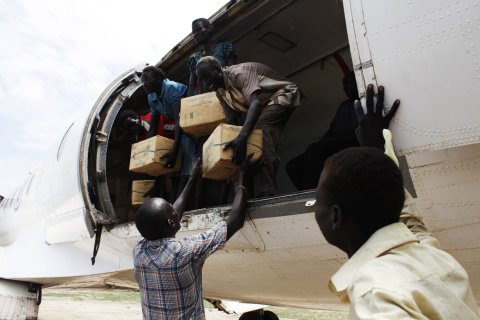
On Darfur and Sudan, Power worked closely with another rising US advocate of intervention in Africa, John Prendergast. Prendergast had started his career as a humanitarian in Sudan, writing reports on the excruciating violence between rival southern militias for Human Rights Watch. Under Bill Clinton, he had worked at the National Security Council as Director for African Affairs and as an advisor to Rice in the State Department. He would later work for the International Crisis Group, then co-found the Enough Project – "the project to end genocide and crimes against humanity". There, Prendergast became the humanitarians' bridge to the Hollywood elite, helping recruit Clooney (Sudan), Angelina Jolie (sexual violence in war zones), Matt Damon (water), Ben Affleck (Congo) and Don Cheadle (genocide and environment).
When Obama was elected, humanitarians extended their reach further into government. The new president appointed Power as Special Assistant to the President in the State Department and a Senior Director at the National Security Council. He made Susan Rice ambassador to the UN. In 2011 Rice and Power led the argument inside the White House in favour of attacking Libya to protect civilians. In 2013, Obama promoted Rice to National Security Advisor, after briefly considering her to replace Hillary Clinton as Secretary of State, while Power took Rice's old job at the UN.
The humanitarians' ascent was complete. What had begun as an ideal inside the protest movement of the 1960s was, 50 years later, a cornerstone of establishment Western foreign policy.
April 2014, Individuation
The accusation most commonly levelled at humanitarians is that their efforts can often be more about the saviour than the saved. There is no doubt about the nobility of their goals: an end to suffering and war. But though humanitarians like to say they champion universal human values, it's probably more accurate to say they advocate the spread of enlightenment, as it is understood in the West. Naturally, that presupposes that other parts of the world, and their peoples, are less progressive.
The Responsibility to Protect wrote in stone that some governments are better than others. In that sense, R2P embodies the same instincts as the kinder aspects of colonialism. Like imperialism, the foundation of humanitarianism is that the West knows best. Like imperialism, humanitarianism overrules others' sovereignty in the name of civilising them. Like imperialists, humanitarians often find themselves in opposition to doctrinaire Islam, whose prescriptions for women and criminals they find hideously backward. And what they present as selflessness can often feel like self-regard on the receiving end.
Africa has received more than its share of foreigners on a quest of what psychiatrist Carl Jung called individuation: discovering oneself out in the world, in this case by journeying through a faraway land. A laudable rite of passage in the West, it is one that inescapably makes Africans bit players in their own story. South Sudan, I began to think, had suffered especially badly from individuation. The South Sudanese won their war for freedom at huge cost. But it was foreigners who shaped much of what followed. On paper, independence might have ushered in a prosperous future. The South owns most of Sudan's oil. It is also blessed with millions of hectares of fertile land around the vast Sudd swamp. Cows, worth $250-400 a head, outnumber people. For the humanitarians, this was a place to start from scratch and finally prove their case with their purest, most ambitious project to date: the creation of an entirely new country.
I first began visiting South Sudan in early 2009. Even then many were saying the plan was too idealistic, too ambitious. Five years ago Juba was little more than a village of mud huts and plastic-bag roofs in the empty flatlands and bare rock hills that marked the Sahara's southern edge. There were a few businesses, a few police, a handful of schools, one run-down hospital and several hundred bureaucrats. With the arrival of thousands of aid workers, there was also the occasional traffic jam of white SUVs on Juba's five tarred roads and a small clutch of bars filled with hustlers and hookers to soak up those expat salaries. But that hardly added up to a country.
Many diplomats doubted the new country would make it. They coined a term to describe its unique status: "pre-failed state." David Gressly, then the UN's coordinator, admitted the run-up to the secession referendum was dominated by "discussion about whether southern Sudan will be ready". The US was the bigger single player in South Sudan, its influence was memorialised by a first president, Kiir, who was rarely seen without the Stetson given him by George Bush, and a national seal that featured a fish eagle, posed to resemble the bald eagle in the American equivalent, over the motto "Justice, Liberty, Prosperity". "South Sudan would not exist without the US," one Western diplomat in Juba told me.
Former US president Jimmy Carter had worked on health and democracy in Sudan for years. When I phoned him to ask whether southern Sudan was ready for independence, he replied simply: "No." General Scott Gration was the US Special Envoy for Sudan in those years. He called the timetable "hard; frankly very, very hard" and described his task as ensuring "civil divorce, not civil war". "This place could go down in flames tomorrow," he said. "The probability of failure is great." Particularly depressing was how the leaders of the south showed every sign of behaving as badly as their enemies in the north. Two thirds of the southern government were illiterate. Perhaps that helped explain why they left dealing with some of the worst levels of health, education and poverty in the world – anything, really, that concerned building a new nation – to aid workers.
The ministers' prime focus seemed to be dividing up oil revenues among themselves. In 2011, several diplomats told me the government had stolen $14bn in oil money since 2005. That didn't stop the south from attacking the north in 2012 and trying to steal what oil remained on the other side of the border.
There were other signs of thuggery. Journalists were being beaten, imprisoned and killed. A constitution drawn up for the new nation by Kiir granted him authoritarian powers. Worst of all, many southern leaders had turned on each other. Even before the Dinka-Nuer war erupted, thousands were dying every year in tribal clashes over land and cattle.
Given the size of the task and the need to lead by example, the humanitarians might still have proved their worth if they were able to show impressive results. They didn't. In 2005, South Sudan's donors had set up a $526m fund to get the country on its feet by paying for roads, running water, agriculture, health and education. Four years later, it had only spent $217m of that. A World Bank investigation discovered its staff, who were managing the fund, were out of their depth. They had held up any spending for a whole year, for instance, before deigning to explain to the southern government that it would need to open a bank account before any pay-outs could be made. Then there was the UN, with its budget of just less than $924m a year and its 70 fortified bases across the country. It escaped no South Sudanese that the single biggest infrastructure project – what South Sudan lacked above all else – was housing and offices for foreigners.
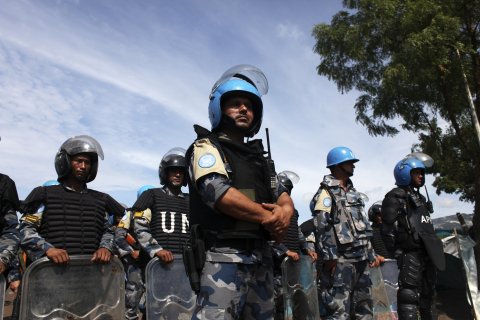
Every time I returned to South Sudan, I heard more anger at these giant air-conditioned, razor-wired moon-bases on the edge of every town, which managed the neat trick of simultaneously focusing the UN's efforts on itself while also cutting it off from the people it was meant to assist. The bases, I felt, symbolised the dilemma confronting humanitarianism. By designating one people as able to help and another as in need of that help, aid can disable. Empowerment programmes can disempower. The very effort of trying to lift a people up can diminish them.
South Sudan threw up other contradictions. It turned out freedom, by its very nature, couldn't be shepherded or done on another's behalf. When South Sudan's leaders interpreted their freedom as the freedom to kill each other, and the world reacted with horror, Kiir and others accused the world of misunderstanding what it had helped create. Freedom meant freedom from everyone – from Khartoum, yes, but also from erstwhile friends. Even in a partially-formed state like South Sudan, the world had far less influence than it imagined.
President Kiir was especially intolerant of suggestions that he owed anyone. "I am not under your command," he told Ban Ki-moon in 2012 when the UN Secretary-General urged him to end his brief invasion of the north. "I am a head of state accountable to my people. I will not withdraw the troops." In January, when the world demanded an end to the fighting, Kiir's government staged mass rallies outside UN bases across the country demanding that the foreigners leave.
After Hilde Johnson, the Norwegian head of the UN Mission in South Sudan (UNMISS), protested at the way UN relief convoys were being harassed and delayed, Kiir accused her of trying to supplant him. "Hilde Johnson and the UN are running a parallel government," he said. "They want to be the government of this country." In September 2014, after months of ever louder foreign aid agency warnings of a looming famine, Kiir's government responded by announcing the foreigners had to go. Within a month, it decreed, 80% of all management or secretarial positions in all agencies or businesses in the country had to be filled with South Sudanese.
The End?
When I phoned him from Juba in April this year, Prendergast said any expectations that South Sudan would experience a smooth birth ran counter to the violent norms of human history. But it was also true, he said, that South Sudan showed that the way the world pursues its interventions "is crushingly flawed and will never make a difference unless it's altered. You have this plan where humanitarians are dispatched to help build a state – and they run smack up against political forces that have no interest in long-term peace and stability, that benefit from instability and no transparency. [The humanitarians] work on development before the war is over. They work with governments that are completely unreformed. The rebels are integrated into a national army without reform, so their predation continues. At this point in South Sudan, everybody has failed at their function."
So far, the UN has been unable even to protect its own bases, let alone venture out to stop the killing. "These forces were sent for state building, not war," said Prendergast. "You need to get troops that are willing to fight." Even emergency relief has been insufficient. By September 2014 around 1.7 million people had been displaced. Cholera swept Juba when the rains arrived in mid-May killing more than 130 and infecting close to 6,000, many of them refugees camped outside the UN's main base in Juba. While the spread of the disease appears to be stalling, malaria has now also rocketed. Aid agencies are reporting rising malnutrition and sporadic starvation whilst warning of a fully-fledged famine within months. Those warnings followed one by UN Secretary-General Ban Ki-moon to the Security Council that, in a worst case scenario, "half South Sudan's 12 million people will either be displaced internally, refugees abroad, starving or dead by the year's end".
At talks in Nairobi in June Kiir and Machar did agree, at least in principle, to share power again in a national unity government. But with the underlying tension unhealed, any hope that offered seemed slim.
So maybe, sighed a few elder diplomats in Juba, maybe you just withdrew. Asked what the world had accomplished in South Sudan, one senior Western diplomat with decades of experience in Sudan replied: "I would say we have saved a lot of lives." But it was a fair question, he said, whether two generations of foreign efforts had had the opposite effect. "Did we create this?" asked the diplomat. "If we had bailed out 20 years ago, would the country be more politically mature now? Probably, yes." A few minutes later, I noticed the diplomat was struggling not to cry. Seeing Ngor and me off at the steel gates of his high-walled compound, he said: "I honestly don't think anybody here has any answers any more."
But the humanitarian character meant that, whatever the doubts, whatever the misgivings, there was no question of quitting. By positioning themselves as the protectors of all, humanitarians all but knowingly set themselves up for failure. Confronted by it, I heard scores of US diplomats, UN officials, aid workers and activists accept responsibility, confess they should have done more – and refuse to be deterred. Failure was no reason to doubt the cause. When I spoke to her in April, UN chief Hilde Johnson stressed the enormity of the task still ahead. "A peace agreement is just a few signatures on a piece of paper," she said. "Actual peace starts the day the signatures are dry."
When I met Clooney by the Nile in 2012, I'd asked him why he kept going to South Sudan, what he got out of it. He said: "The truth is I think any human being, once they participate in something that's bigger than themselves and something that you can't fix yourself . . . the idea that you wouldn't continue . . . you would feel as if you had done something terrible, you'd abandoned them. So you have to continue."
Fifty years ago, Africa's dislike of outsiders telling them what to do produced an angry wave of independence. Today a decade of rapid economic growth has once again given the continent a spirit of impatient African assertion. Still, there will always be Africans who, for their own reasons, ask the humanitarians to intervene.
Clooney had mentioned that one South Sudanese official to whom he was particularly close was Ezekiel Lol Gatkuoth, former ambassador to the US. He has since been released, but when I was in Juba he was on trial for treason, one of four government figures Kiir accused of instigating the violence in December. The four were being kept under lock and key except for the occasional court appearance.
One of those happened to fall on a day that Ngor and I were in Juba. We arrived early, positioned ourselves at the court entrance and, as the four accused were driven in and swept past in a cloud of soldiers and assistants, Ngor slipped a note with a handful of questions I had prepared into the hand of Gatkuoth's lawyer.
"Some say the world should pull out," I wrote. "Some argue for more intervention. What do you think?" The lawyer returned the note the next day, with Gatkuoth's replies scribbled under my queries. The disaster in South Sudan had a clear solution, wrote Gatkuoth: "George Clooney must get more engaged now to help shape the future of this country."
Alex Perry's in-depth ebook Clooney's War: South Sudan, Humanitarian Failure and Celebrity is available now from Newsweek Insights.
Correction: This article originally stated that the bird on South Sudan's flag was a bald eagle - as the author was told when he asked at government offices. It is in fact a fish eagle.


